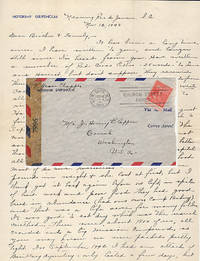I HAD IT BETTER . . . BEING KEPT IN THE CAMP HOSPITAL . . .. NEVERTHELESS I LOST ABOUT TEN POUNDS . . . HARD WORK AND POOR FOOD." - Letter from an American missionary to her brother as she travels home aboard the Swedish Repatriation Ship Gripsholm after having been released from a Japanese internment camp in China by V. Grace Clapper to J. Henry Clapper - 1943
by V. Grace Clapper to J. Henry Clapper

I HAD IT BETTER . . . BEING KEPT IN THE CAMP HOSPITAL . . .. NEVERTHELESS I LOST ABOUT TEN POUNDS . . . HARD WORK AND POOR FOOD." - Letter from an American missionary to her brother as she travels home aboard the Swedish Repatriation Ship Gripsholm after having been released from a Japanese internment camp in China
by V. Grace Clapper to J. Henry Clapper
- Used
- very good
In this letter, Grace informs her brother of her internment and repatriation experience.
"Have written a number of Red Cross letters - 25 words. . .. These we were permitted to write from camp Wei Hsien, Shantung. . .. I had it better than Hazel, being kept in the Camp Hospital . . . where we had quite good food most of the time. Nevertheless I lost about ten pounds in weight . . . hard work and poor food. They had good bread in abundance . . . and that was a life saver for many folks. . .. There were about 1900 of us . . . so you may know how we were packed pretty tight. In September 1942 I had an attack of Bacillary dysentery. . .. I was put to bed in my own house . . . till May 12th when I too, had to go to Internment Camp. . .. While in Camp Hospital I seemed to make no improvement and just before we left for Shanghai they found I also had an amoeba of the intestines. [We've had] a wonderful trip so far, and this is a great boat - 1500 of us on board, just about as compact as we were in Camp . . . and we surely have good wholesome food, and free chocolate bars. . .. We're all taking vitamin tablets furnished by Uncle Sam, and we invalids get injections of vitamin C. . .."
Grace spent over 25 years at the Church of the Brethren's Show Yang Girls School in Shansi province. When the Japanese overran Shansi, three of her friends disappeared, never to be seen again. Grace survived and was held at Peking before being transferred to the Wei Hsien internment camp in Shandong province. (See "China Missionary. . .. " in the Meyersdale Republican, May 19, 1949.). Immediately after Pearl Harbor, the United States contacted Japan and proposed the exchange of diplomats and civilians caught abroad. Japan agreed, and both countries chartered vessels to affect the transfesr. The U.S. contracted with the Swedish ship M.S. Gripsholm, and for this voyage (the second exchange) the Japanese used the Nippon Yusen Kaisha linerTeia Maru, which after departing Yokohama, stopped at Shanghai where Grace boarded. The ships met at Mormugao in Portuguese India where repatriates from the two vessels passed on the quay as they disembarked at the stern of one vessel and embarking at the bow of the other. (For more information, see Fiset's Detained, Interned, Incarcerated.)
A rare piece of World War II postal history; see Fiset's "Relative Scarcity" table, made all the more valuable by being sent airmail and the use of Gripsholm stationery by a returning missionary internee.
-
Bookseller
Kurt A. Sanftleben, LLC
(US)
- Format/Binding Envelope or Cover
- Book Condition Used - Very good
- Quantity Available 1
- Place of Publication Near Rio de Janiero to Omak, Washington
- Date Published 1943